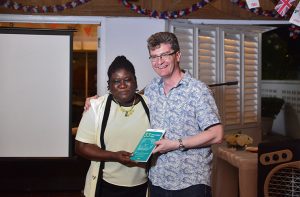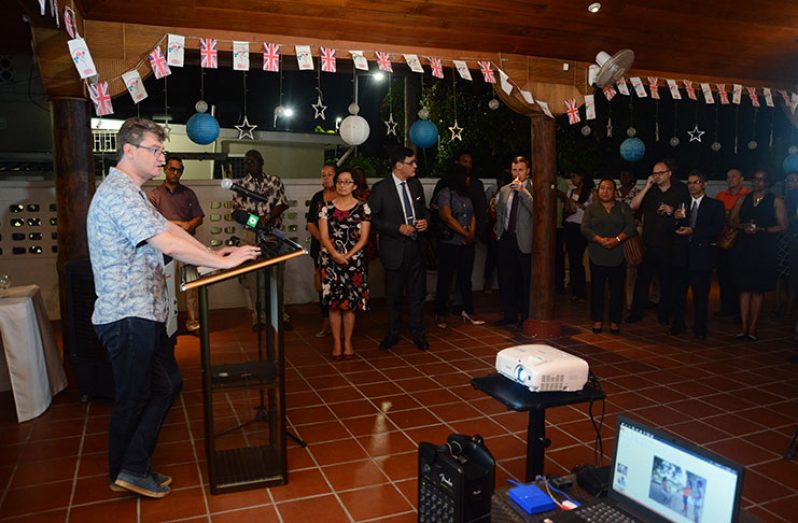– historic conservation project helping to formulate Guyana’s conservation policies
– Traditional Knowledge Action Plan to be created
By Paul Mc Adam
THE efforts of Country Coordinator Deirdre Jafferally, Senior Community Researcher Rebecca Xavier, Environmental Protection Agency’s Policy and Technical Coordinator Sean Mendonca, researchers Bernice Robertson, Brace Albert, Lakeram Haynes and Interns Ena George and Betsy Alvin were lauded, on the evening of March 6, by British High Commissioner Greg Quinn.
The high commissioner, host of a cocktail reception at his Bel Air Gardens residence, said the event which followed the launch of this, the latest Darwin Initiative 18 months ago, was a welcome of sorts for the dedicated researchers.
High Commissioner Quinn explained that projects addresses threats to biodiversity such as over exploitation; invasive species; habitat degradation and loss; climate change mitigation and adaptation; and pollution. He quoted Golfer Jack Nicklaus’s reference to the environment, I think our job is to try and take the environment, take what the Good Lord has given us and expand upon it or enhance it, without destroying it.” The British High Commissioner was later presented with a copy of “33 Amerindian Tales from the North Rupununi Savannah” – a soon to be published book, edited by Geraud de Ville Goyet.

Country Coordinator Jafferally, via a PowerPoint presentation, explained that the project was aimed at “Integrating Traditional Knowledge into National Policy”. She noted that researchers were engaged in 65 communities across the five protected areas and training indigenous residents on the use of computer tablets, to interview community elders and leaders about traditional and cultural practices. These, Jafferally said, are being complied and shared with other stakeholders including “coastlander” officials. “They will form the bedrock of national policies, to shape Guyana’s conservation measures.” She was assisted by Xavier and Mendonca, and further explained that the information gathered, along with widespread consultations in Hinterland communities, will be used to create a Traditional Knowledge Action Plan (TKNAP).
The current project, funded at a cost of $114,669,000 million dollars, began in July 2017 and ends in March 2020 and, according to Jafferally, more funding would be welcome due to the evolving expenses which often occur.
The Darwin Initiative researchers have also been working closely with the Protected Areas Commission as part of the agency’s mandate to protect, manage and expand bio-diversity systems in protected areas such as the Kanuku, Iwokrama and Masakanari areas according to Deputy Commissioner Odacy Davis. She also emphasised the importance of the TKNAP and its role in shaping sustainable conservation efforts.
Delivering closing remarks on behalf of Minister of Indigenous Peoples’ affairs Sydney Allicock was North Rupununi District Development Board (NRDDB) executive Michael Williams. He welcomed the efforts of the research team to preserve the Indigenous peoples’ traditions and practices and expressed the hope that his community, the North Rupununi Wetlands could also be declared a protected area prior to him, ‘closing his eyes’.
The Darwin Initiative funds projects that help countries rich in biodiversity but with limited financial resources, to commit to objectives under one or more biodiversity conventions.
These include The Convention of Biological Diversity, The Convention on International Trade in Endangered Species of Wild Flora and Fauna, The Nagoya Protocol on Access and Benefit Sharing and the International Treaty of Plant Genetic Resources for Food and Agriculture.
The initiative, launched by the UK Government in 1992 at the Rio Summit, is funded by the UK Department for the Environment, Food and Rural Affairs, the Department for International Development and the Foreign and Commonwealth Office.
Since the Darwin Initiative’s launch, 1,123 projects were completed in 159 countries at a cost of $42.1 billion dollars. Guyana has benefited from 8 projects at a cost of $385 million dollars, thus far.




.jpg)









